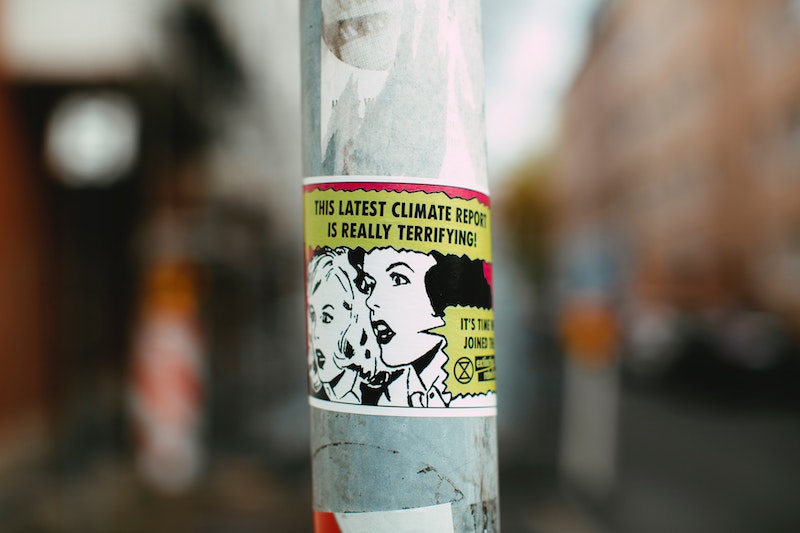By Danielle Castillo and Jared Stilwell
While conversations concerning climate change continue to ritually concentrate on the consequences we face and the action needed in order to ensure sustainability, we often disregard the mental health effects that natural disasters and fear-dominated rhetoric pose towards individuals today. Whether it be extreme flooding in indigenous communities in South America or viewing a Facebook post detailing the overwhelming effects of oversea fishing from the comfort of your apartment in California, experiencing symptoms of anxiety and worry has become common in discussions of climate change. Unfortunately, this frames environmental efforts as hopeless and the consequences of climate change as inevitable. It is this model of hopelessness that has caused the mental health of communities around the world to suffer. It is thus more than necessary we include strategies of dealing with despair in conversations of hope towards a sustainable future.
As Maria Ojala explains, worry and anxiety can cripple potential critical actors in climate change movements. If we do not address what is directly stunting action, how can we move forward? This can be more closely observed in India where there has been documented high rates of farmer suicides as a response to crop failure due to extreme droughts (See Padhy, Sarkar, Panigrahi, & Paul, 2015). The effects of climate change extend beyond the immediate environment that surrounds us, we must therefore acknowledge how climate anxiety functions in order to find hope at all.

Ojala further outlines that climate change education has to produce a way to tackle this anxiety. By understanding, learning, and applying coping mechanisms for the preservation of people’s mental health, the hope for fighting climate change becomes viable. These methods include learning how to engage local communities through messaging—as seen with the High Water Line initiative. Even when reflecting on the emergence of young climate change activists it was found that their mental health actually improved as a result of them taking action in order to save our planet (4 Activist Girls). Interestingly enough, by understanding the social, spiritual, and the emotionality of climate change they were able to develop their own treatment to cope with their mental health issues. Emotional reckoning thus enabled activists to find hope both for themselves and for the world at large.
Our definition of radical hope:
In order for hope to be truly radical, we need to recognize our anxiety and actively push against its strain. We can do this by gaining an emotional understanding of where we stand in relation to hopelessness. This method of thinking forces the individual to look internally first and evaluate before addressing worldly issues, thus providing an alternative method of mobilization which can be truly radical within itself. In this case, every act you make—from classroom discussions, changing daily consumption habits, to calling representatives to push for local policy change—becomes inherently radical because taking action becomes a form of internal and external healing. Radical hope is the process of acknowledging the symptoms of anxiety and worry, processing how despair fuels you, and choosing to hope in spite of the circumstances. Hope can take many forms, but to radically hope means to believe in the preservation of your life and the life of the world.
Resources:
Kamentz, Anya. “You Need To Act Now’: Meet 4 Girls Working To Save The Warming World.” NPR, January 19, 2020.
Ojala, Maria. “Facing Anxiety in Climate Change Education : From Therapeutic Practice to Hopeful Transgressive Learning.” Canadian Journal of Environmental Education 21 (2016): 41–56.
Cunsolo Willox, Ashlee, Sherilee L. Harper, James D. Ford, Victoria L. Edge, Karen Landman, Karen Houle, Sarah Blake, and Charlotte Wolfrey. “Climate Change and Mental Health: An Exploratory Case Study from Rigolet, Nunatsiavut, Canada.” Climatic Change 121, no. 2 (November 1, 2013): 255–70.
Fritze, Jessica G., Grant A. Blashki, Susie Burke, and John Wiseman. “Hope, Despair and Transformation: Climate Change and the Promotion of Mental Health and Wellbeing.” International Journal of Mental Health Systems 2, no. 1 (September 17, 2008): 13.
Padhy, Susanta Kumar, Sidharth Sarkar, Mahima Panigrahi, and Surender Paul. “Mental Health Effects of Climate Change.” Indian Journal of Occupational and Environmental Medicine 19, no. 1 (2015): 3–7.
Palinkas, Lawrence A. “Climate Coping,” from “One of the most overlooked consequences of climate change? Our mental health.” Environmental Health News, December 2, 2019.
Ro, Christine. “The Harm from Worrying about Climate Change.” BBC Future, October 10, 2019.
Mosher, Eve. HighWaterLine: Visualizing Climate Change. highwaterline.org.

